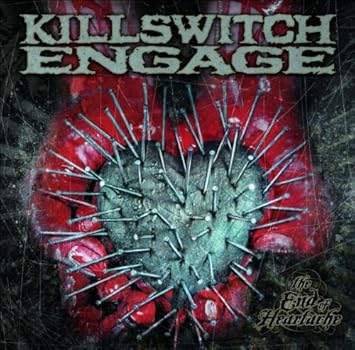I got into metal, seriously, in a weird way. I was sitting in on a friend's college radio show, and hearing a few of the tracks he was playing caught my attention in a way heavy music never had before. That might not be odd, but as a someone growing up in Upstate New York, the fact that the music was European power metal surely was. I don't know if I could have found more than two people I knew even casually who could have named a single band from that scene. Yet that is the music that moved me towards heavy metal.
At that time, the mainstream scene was seeing the rise of metalcore as a real force. Though I was focused on the European scene, I was taking note of the American bands that were leaving an impact. One friend in particular would often point me towards a specific band; Killswitch Engage.
This was just as "The End Of Heartache" was being released, and with ample time to kill on my hands, I would occasionally give the album a listen. It didn't strike me as anything special, but ever so often I would have the nagging thought that I needed to listen to it again, because I was missing something. Those feelings have kept at me for more than ten years now, even as I was reviewing new albums from the band, and just recently I decided it was once again time to look back at what I was missing.
The two incarnations of Killswitch Engage are nearly indistinguishable, in terms of the important traits, but they also couldn't be more different. The Jesse versus Howard debate still rages, because even though the band is doing the exact same things, their forces of personality completely changed how the music was heard. For me, the answer to the debate is simple. Jesse was there when they were still rough around the edges, and came back when they were going through the motions. Howard was there when the band perfected their form. He is, to me, the definitive voice of Killswitch Engage.
Two things about "The End Of Heartache" are clear to me, listening to the record these years later. One, it is the perfect encapsulation of what metalcore is all about. If you need a bllueprint for the genre, this album is it. There is ferocious heft to the guitars, but Howard is able to take the anger of an entire generation and turn that into anthems of communal self-esteem boosting. Killswitch was able to do what the other metalcore bands couldn't, by moving beyond just alternating clean and harsh vocals. Howard tapped into real emotion, and wrote melodies that worked on stage in a way that the audience could share the experience with the band. It was something special, and despite the simplicity of the construction, it was rock solid.
Unfortunately for Killswitch Engage, it was also the only one of their traditional albums that achieved the feat. Every other album of theirs has been trying to recapture that spark, without being able to keep the flame alive.
The one exception is their 2009 self-titled album, which broke the rules. Working with Brendan O'Brien, Killswitch Engage decided to push themselves in a different direction. Rather than focusing on their metal roots, that album pushed them further into melodic territory. The result was an album that fans hated, and that is always overlooked, but it's also the album that sticks with me the most. Is it softer than their others? Maybe. Howard screams a bit less, and the guitar tone is a bit fuzzier, but the band is still more than heavy enough. What it does best is twist the formula just enough to show us we don't have to be the self-loathing youth that first connected with the band's music. This was their growth, their showcase to the world that they had become adults who knew how to handle their baggage. They didn't need to share the anger with the world, because they were mature enough to push it into productive avenues.
That was short-lived, as not long after the record was released the band went through the kind of turmoil that could only have one result; the nostalgic attempt to recreate their glory days. You could say it worked, but nothing the band has done since then has reached the same heights. It's too safe, too clinical, to expected.
But there will always be something in me that looks back to those few records and understands now that Killswitch Engage changed heavy metal. I can't say if it was for the better or the worse, but I do know that no other band did what they did as well, not even themselves.


No comments:
Post a Comment